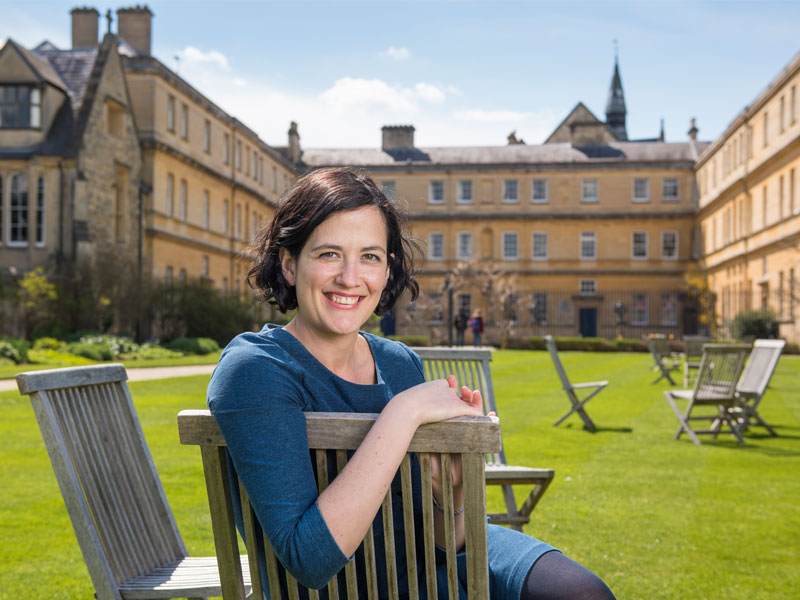It was the decision to return to her roots that led Dr María del Pilar Blanco away from an academic career in French and English literature, and down her current path: ‘For me, it was a way to know more about the connections between where I’m from – Puerto Rico and the Caribbean – and the rest of Latin America. It allowed me a greater breadth of knowledge into the language that I use and take for granted.’
Dr Blanco was appointed Associate Professor in Spanish American Literature at Trinity College, Oxford in 2012. To undergraduates she teaches Spanish American literature from 1810 – the beginning of the Wars of Independence in Central and South America – to the present day, and with postgraduates she focuses on later 19th- to mid-20th-century Latin American literature and culture. ‘I do cover a lot,’ she says. ‘It’s a very popular area.’
Dr Blanco explains that although Spanish America is ‘very relevant, politically, in the present moment’, interest in the region’s literary output has been on the rise since the 1950s. Authors like Gabriel García Márquez, Mario Vargas Llosa and Julio Cortázar ‘revamped Latin American literature forever, in the eyes of the global reading public. The world couldn’t get enough of them.’
I pride myself in having produced a set of lectures and seminars for my students where they can learn from a vast expanse of literary history from Latin America.Dr María del Pilar Blanco
This may have heralded a turning point in the appreciation and understanding of Spanish American culture worldwide, but Dr Blanco is keen for her students to think about what happened in 19th-century Latin America, before this ‘so-called boom’ occurred. She elaborates: ‘I’m really interested in them seeing how Latin America was playing a big part in the world, and that it wasn’t this backwater region – it was participating in political conversations with the United States, with Europe. I want them to think about literature as part of this big global network of political and aesthetic activity.’
Inspiring students to think critically about a subject in this way is a key part of Oxford’s celebrated tutorial system, which ensures that students have the opportunity to engage with, learn from and be challenged by world-class academics.
‘I pride myself in having produced a set of lectures and seminars for my students where they can learn from a vast expanse of literary history from Latin America,’ Dr Blanco explains. ‘I have introduced them to authors that they have never heard of, but who are, I think, as important as other authors that we always talk about.’

Dr Blanco’s own research focuses on the emergence of popular science writing in Spanish American periodicals of the late 19th century, and she notes that there is often ‘a nice rapport’ between her own work and that of her graduate students: ‘I’m hoping that I will have one or two students who will become as interested as I am in the nitty-gritty work that I do, looking through newspapers and digging out interesting articles.’
While the pursuit of Dr Blanco’s own research plays a crucial role in maintaining the University’s position as a centre of excellence, it also highlights the effect that current economic conditions have had on the funding of the humanities. Thankfully, this is where philanthropy can help to lessen the burden. ‘Oxford has guarded the humanities so well,’ says Dr Blanco. ‘A world university is one where you safeguard your languages, where you inculcate an interest in different cultures and in different literatures, and we have a responsibility to keep Oxford as one of the top places to do that.’
Mexico is one of the great cultures of the world. When I go to a Mexican library I just revel in the possible lines of research I can pursue – I love it!Dr María del Pilar Blanco
Now that her post has been endowed, Dr Blanco hopes that there will be a renewed focus on widening interest in Spanish American literature and culture at Oxford. This would, she explains, include developing more exchange programmes with Latin America, and establishing a ‘much more prolonged connection’ with Mexico, which is a country she focuses on substantially in her own work.
‘Mexico is one of the great cultures of the world. When I go to a Mexican library I just revel in the possible lines of research I can pursue – I love it!’ she says. Her hope is that one day her students will have the opportunity to share these experiences too: ‘I think that by establishing connections with countries in Latin America, and showing them that we are interested in keeping alive meaningful conversations and collaborations, it will help us to develop in students a nuanced knowledge of what Latin America is all about.’